How To Write a Concept Paper for Academic Research: An Ultimate Guide
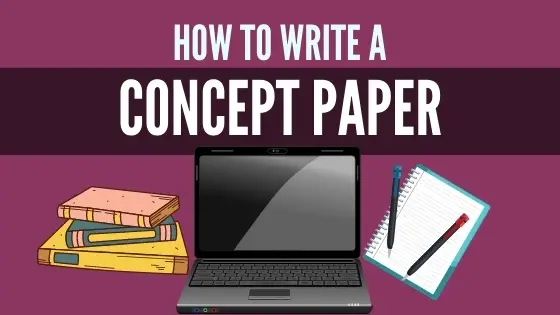
A concept paper is one of the first steps in helping you fully realize your research project. Because of this, some schools opt to teach students how to write concept papers as early as high school. In college, professors sometimes require their students to submit concept papers before suggesting their research projects to serve as the foundations for their theses.
If you’re reading this right now, you’ve probably been assigned by your teacher or professor to write a concept paper. To help you get started, we’ve prepared a comprehensive guide on how to write a proper concept paper.
Related: How to Write Significance of the Study (with Examples)

Table of Contents
What is the concept paper, 1. academic research concept papers, 2. advertising concept papers, 3. research grant concept papers, concept paper vs. research proposal, tips for finding your research topic, 2. think of research questions that you want to answer in your project, 3. formulate your research hypothesis, 4. plan out how you will achieve, analyze, and present your data, 2. introduction, 3. purpose of the study, 4. preliminary literature review, 5. objectives of the study, 6. research questions and hypotheses, 7. proposed methodology, 8. proposed research timeline, 9. references, sample concept paper for research proposal (pdf), tips for writing your concept paper.
Generally, a concept paper is a summary of everything related to your proposed project or topic. A concept paper indicates what the project is all about, why it’s important, and how and when you plan to conduct your project.
Different Types of the Concept Paper and Their Uses

This type of concept paper is the most common type and the one most people are familiar with. Concept papers for academic research are used by students to provide an outline for their prospective research topics.
These concept papers are used to help students flesh out all the information and ideas related to their topic so that they may arrive at a more specific research hypothesis.
Since this is the most common type of concept paper, it will be the main focus of this article.
Advertising concept papers are usually written by the creative and concept teams in advertising and marketing agencies.
Through a concept paper, the foundation or theme for an advertising campaign or strategy is formed. The concept paper can also serve as a bulletin board for ideas that the creative and concept teams can add to or develop.
This type of concept paper usually discusses who the target audience of the campaign is, what approach of the campaign will be, how the campaign will be implemented, and the projected benefits and impact of the campaign to the company’s sales, consumer base, and other aspects of the company.
This type of concept paper is most common in the academe and business world. Alongside proving why your research project should be conducted, a research grant concept paper must also appeal to the company or funding agency on why they should be granted funds.
The paper should indicate a proposed timeline and budget for the entire project. It should also be able to persuade the company or funding agency on the benefits of your research project– whether it be an increase in sales or productivity or for the benefit of the general public.
It’s important to discuss the differences between the two because a lot of people often use these terms interchangeably.
A concept paper is one of the first steps in conducting a research project. It is during this process that ideas and relevant information to the research topic are gathered to produce the research hypothesis. Thus, a concept paper should always precede the research proposal.
A research proposal is a more in-depth outline of a more fleshed-out research project. This is the final step before a researcher can conduct their research project. Although both have similar elements and structures, a research proposal is more specific when it comes to how the entire research project will be conducted.
Getting Started on Your Concept Paper
1. find a research topic you are interested in.
When choosing a research topic, make sure that it is something you are passionate about or want to learn more about. If you are writing one for school, make sure it is still relevant to the subject of your class. Choosing a topic you aren’t invested in may cause you to lose interest in your project later on, which may lower the quality of the research you’ll produce.
A research project may last for months and even years, so it’s important that you will never lose interest in your topic.
- Look for inspiration everywhere. Take a walk outside, read books, or go on your computer. Look around you and try to brainstorm ideas about everything you see. Try to remember any questions you might have asked yourself before like why something is the way it is or why can’t this be done instead of that .
- Think big. If you’re having trouble thinking up a specific topic to base your research project on, choosing a broad topic and then working your way down should help.
- Is it achievable? A lot of students make the mistake of choosing a topic that is hard to achieve in terms of materials, data, and/or funding available. Before you decide on a research topic, make sure you consider these aspects. Doing so will save you time, money, and effort later on.
- Be as specific as can be. Another common mistake that students make is that they sometimes choose a research topic that is too broad. This results in extra effort and wasted time while conducting their research project. For example: Instead of “The Effects of Bananas on Hungry Monkeys” , you could specify it to “The Effects of Cavendish Bananas on Potassium-deficiency in Hungry Philippine Long-tailed Macaques in Palawan, Philippines”.
Now that you have a general idea of the topic of your research project, you now need to formulate research questions based on your project. These questions will serve as the basis for what your project aims to answer. Like your research topic, make sure these are specific and answerable.
Following the earlier example, possible research questions could be:
- Do Cavendish bananas produce more visible effects on K-deficiency than other bananas?
- How susceptible are Philippine long-tailed macaques to K-deficiency?
- What are the effects of K-deficiency in Philippine long-tailed macaques?
After formulating the research questions, you should also provide your hypothesis for each question. A research hypothesis is a tentative answer to the research problem. You must provide educated answers to the questions based on your existing knowledge of the topic before you conduct your research project.
After conducting research and collecting all of the data into the final research paper, you will then have to approve or disprove these hypotheses based on the outcome of the project.
Prepare a plan on how to acquire the data you will need for your research project. Take note of the different types of analysis you will need to perform on your data to get the desired results. Determine the nature of the relationship between different variables in your research.
Also, make sure that you are able to present your data in a clear and readable manner for those who will read your concept paper. You can achieve this by using tables, charts, graphs, and other visual aids.
Related: How to Make Conceptual Framework (with Examples and Templates)
Generalized Structure of a Concept Paper
Since concept papers are just summaries of your research project, they are usually short and no longer than 5 pages. However, for big research projects, concept papers can reach up to more than 20 pages.
Your teacher or professor may give you a certain format for your concept papers. Generally, most concept papers are double-spaced and are less than 500 words in length.
Even though there are different types of concept papers, we’ve provided you with a generalized structure that contains elements that can be found in any type of concept paper.
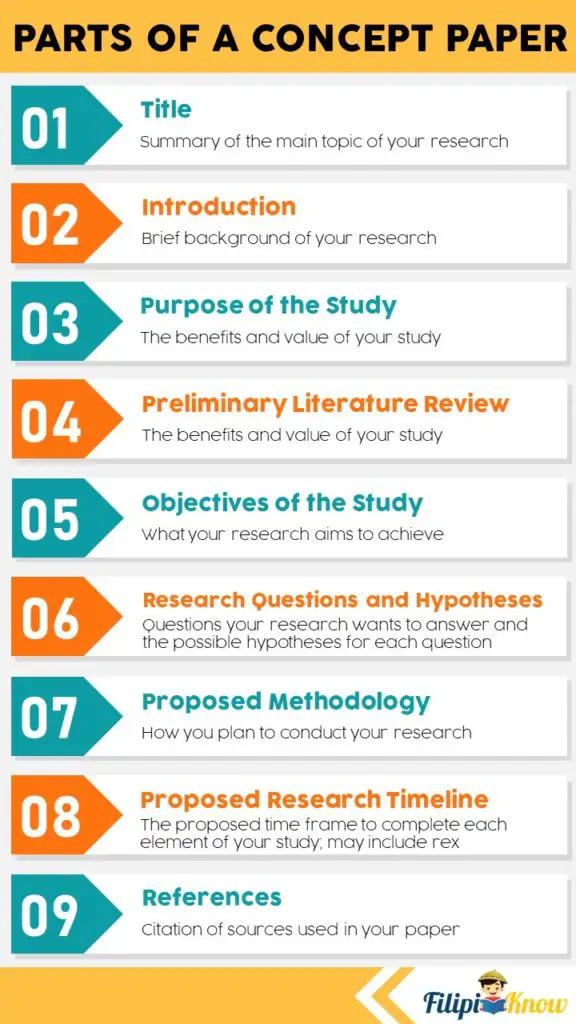
The title for your paper must be able to effectively summarize what your research is all about. Use simple words so that people who read the title of your research will know what it’s all about even without reading the entire paper.
The introduction should give the reader a brief background of the research topic and state the main objective that your project aims to achieve. This section should also include a short overview of the benefits of the research project to persuade the reader to acknowledge the need for the project.
The Purpose of the Study should be written in a way that convinces the reader of the need to address the existing problem or gap in knowledge that the research project aims to resolve. In this section, you have to go into more detail about the benefits and value of your project for the target audience/s.
This section features related studies and papers that will support your research topic. Use this section to analyze the results and methodologies of previous studies and address any gaps in knowledge or questions that your research project aims to answer. You may also use the data to assert the importance of conducting your research.
When choosing which papers and studies you should include in the Preliminary Literature Review, make sure to choose relevant and reliable sources. Reliable sources include academic journals, credible news outlets, government websites, and others. Also, take note of the authors for the papers as you will need to cite them in the References section.
Simply state the main objectives that your research is trying to achieve. The objectives should be able to indicate the direction of the study for both the reader and the researcher. As with other elements in the paper, the objectives should be specific and clearly defined.
Gather the research questions and equivalent research hypotheses you formulated in the earlier step and list them down in this section.
In this section, you should be able to guide the reader through the process of how you will conduct the research project. Make sure to state the purpose for each step of the process, as well as the type of data to be collected and the target population.
Depending on the nature of your research project, the length of the entire process can vary significantly. What’s important is that you are able to provide a reasonable and achievable timeline for your project.
Make sure the time you will allot for each component of your research won’t be too excessive or too insufficient so that the quality of your research won’t suffer.
Ensure that you will give credit to all the authors of the sources you used in your paper. Depending on your area of study or the instructions of your professor, you may need to use a certain style of citation.
There are three main citation styles: the American Psychological Association (APA), Modern Language Association (MLA), and the Chicago style.
The APA style is mostly used for papers related to education, psychology, and the sciences. The APA citation style usually follows this format:
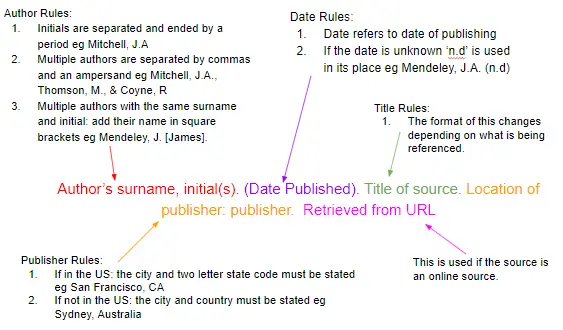
The MLA citation style is the format used by papers and manuscripts in disciplines related to the arts and humanities. The MLA citation style follows this format:
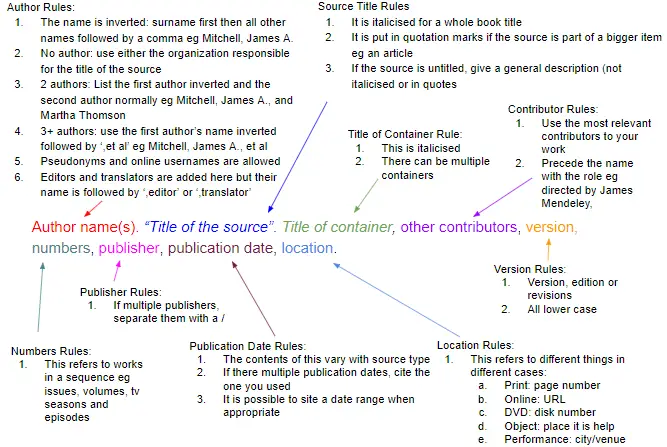
The Chicago citation style is usually used for papers related to business, history, and the fine arts. It follows this citation format:

This is a concept paper sample provided by Dr. Bernard Lango from the Jomo Kenyatta University of Agriculture and Technology (modified for use in this article). Simply click the link above the download the PDF file.
- Use simple, concise language. Minimize the use of flowery language and always try to use simple and easy-to-understand language. Too many technical or difficult words in your paper may alienate your readers and make your paper hard to read.
- Choose your sources wisely. When scouring the Internet for sources to use, you should always be wary and double-check the authenticity of your source. Doing this will increase the authenticity of your research project’s claims and ensure better data gathered during the process.
- Follow the specified format, if any. Make sure to follow any specified format when writing your concept paper. This is very important, especially if you’re writing your concept paper for class. Failure to follow the format will usually result in point deductions and delays because of multiple revisions needed.
- Proofread often. Make it a point to reread different sections of your concept paper after you write them. Another way you can do this is by taking a break for a few days and then coming back to proofread your writing. You may notice certain areas you’d like to revise or mistakes you’d like to fix. Make proofreading a habit to increase the quality of your paper.
Written by Ruth Raganit
in Career and Education , Juander How
Ruth Raganit
Ruth Raganit obtained her Bachelor of Science degree in Geology from the University of the Philippines – Diliman. Her love affair with Earth sciences began when she saw a pretty rock and wondered how it came to be. She also likes playing video games, doing digital art, and reading manga.
Browse all articles written by Ruth Raganit
Copyright Notice
All materials contained on this site are protected by the Republic of the Philippines copyright law and may not be reproduced, distributed, transmitted, displayed, published, or broadcast without the prior written permission of filipiknow.net or in the case of third party materials, the owner of that content. You may not alter or remove any trademark, copyright, or other notice from copies of the content. Be warned that we have already reported and helped terminate several websites and YouTube channels for blatantly stealing our content. If you wish to use filipiknow.net content for commercial purposes, such as for content syndication, etc., please contact us at legal(at)filipiknow(dot)net

Concept Papers in Research: Deciphering the blueprint of brilliance
Concept papers hold significant importance as a precursor to a full-fledged research proposal in academia and research. Understanding the nuances and significance of a concept paper is essential for any researcher aiming to lay a strong foundation for their investigation.
Table of Contents
What Is Concept Paper
A concept paper can be defined as a concise document which outlines the fundamental aspects of a grant proposal. It outlines the initial ideas, objectives, and theoretical framework of a proposed research project. It is usually two to three-page long overview of the proposal. However, they differ from both research proposal and original research paper in lacking a detailed plan and methodology for a specific study as in research proposal provides and exclusion of the findings and analysis of a completed research project as in an original research paper. A concept paper primarily focuses on introducing the basic idea, intended research question, and the framework that will guide the research.
Purpose of a Concept Paper
A concept paper serves as an initial document, commonly required by private organizations before a formal proposal submission. It offers a preliminary overview of a project or research’s purpose, method, and implementation. It acts as a roadmap, providing clarity and coherence in research direction. Additionally, it also acts as a tool for receiving informal input. The paper is used for internal decision-making, seeking approval from the board, and securing commitment from partners. It promotes cohesive communication and serves as a professional and respectful tool in collaboration.
These papers aid in focusing on the core objectives, theoretical underpinnings, and potential methodology of the research, enabling researchers to gain initial feedback and refine their ideas before delving into detailed research.
Key Elements of a Concept Paper
Key elements of a concept paper include the title page , background , literature review , problem statement , methodology, timeline, and references. It’s crucial for researchers seeking grants as it helps evaluators assess the relevance and feasibility of the proposed research.
Writing an effective concept paper in academic research involves understanding and incorporating essential elements:
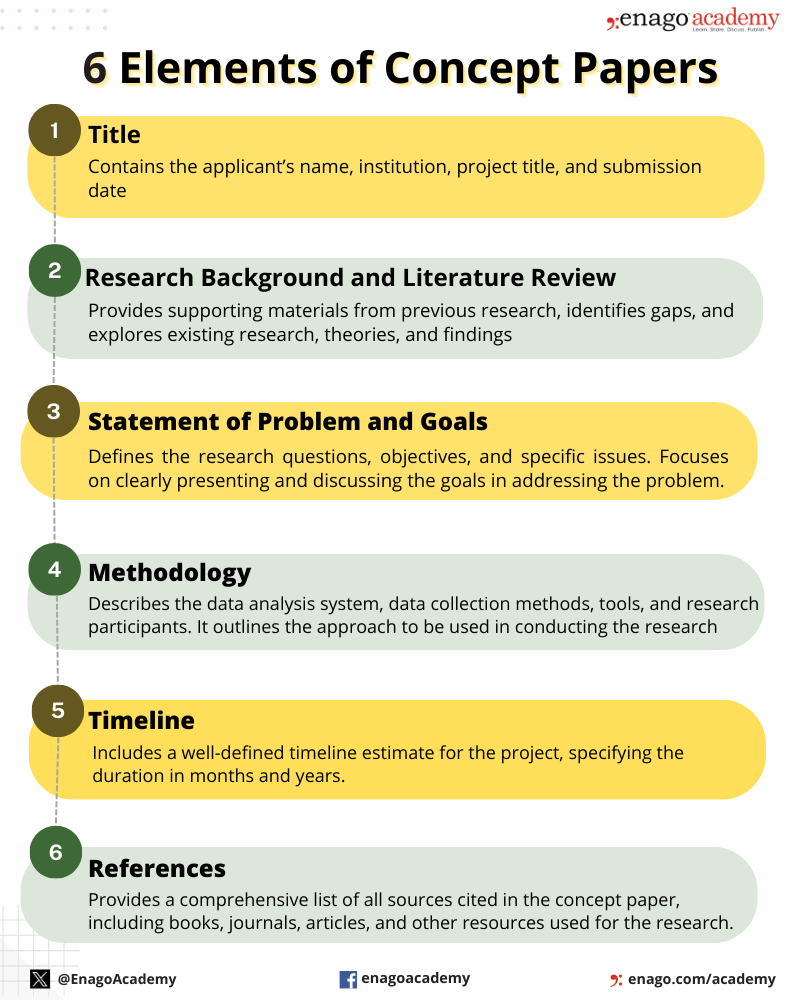
How to Write a Concept Paper?
To ensure an effective concept paper, it’s recommended to select a compelling research topic, pose numerous research questions and incorporate data and numbers to support the project’s rationale. The document must be concise (around five pages) after tailoring the content and following the formatting requirements. Additionally, infographics and scientific illustrations can enhance the document’s impact and engagement with the audience. The steps to write a concept paper are as follows:
1. Write a Crisp Title:
Choose a clear, descriptive title that encapsulates the main idea. The title should express the paper’s content. It should serve as a preview for the reader.
2. Provide a Background Information:
Give a background information about the issue or topic. Define the key terminologies or concepts. Review existing literature to identify the gaps your concept paper aims to fill.
3. Outline Contents in the Introduction:
Introduce the concept paper with a brief overview of the problem or idea you’re addressing. Explain its significance. Identify the specific knowledge gaps your research aims to address and mention any contradictory theories related to your research question.
4. Define a Mission Statement:
The mission statement follows a clear problem statement that defines the problem or concept that need to be addressed. Write a concise mission statement that engages your research purpose and explains why gaining the reader’s approval will benefit your field.
5. Explain the Research Aim and Objectives:
Explain why your research is important and the specific questions you aim to answer through your research. State the specific goals and objectives your concept intends to achieve. Provide a detailed explanation of your concept. What is it, how does it work, and what makes it unique?
6. Detail the Methodology:
Discuss the research methods you plan to use, such as surveys, experiments, case studies, interviews, and observations. Mention any ethical concerns related to your research.
7. Outline Proposed Methods and Potential Impact:
Provide detailed information on how you will conduct your research, including any specialized equipment or collaborations. Discuss the expected results or impacts of implementing the concept. Highlight the potential benefits, whether social, economic, or otherwise.
8. Mention the Feasibility
Discuss the resources necessary for the concept’s execution. Mention the expected duration of the research and specific milestones. Outline a proposed timeline for implementing the concept.
9. Include a Support Section:
Include a section that breaks down the project’s budget, explaining the overall cost and individual expenses to demonstrate how the allocated funds will be used.
10. Provide a Conclusion:
Summarize the key points and restate the importance of the concept. If necessary, include a call to action or next steps.
Although the structure and elements of a concept paper may vary depending on the specific requirements, you can tailor your document based on the guidelines or instructions you’ve been given.
Here are some tips to write a concept paper:
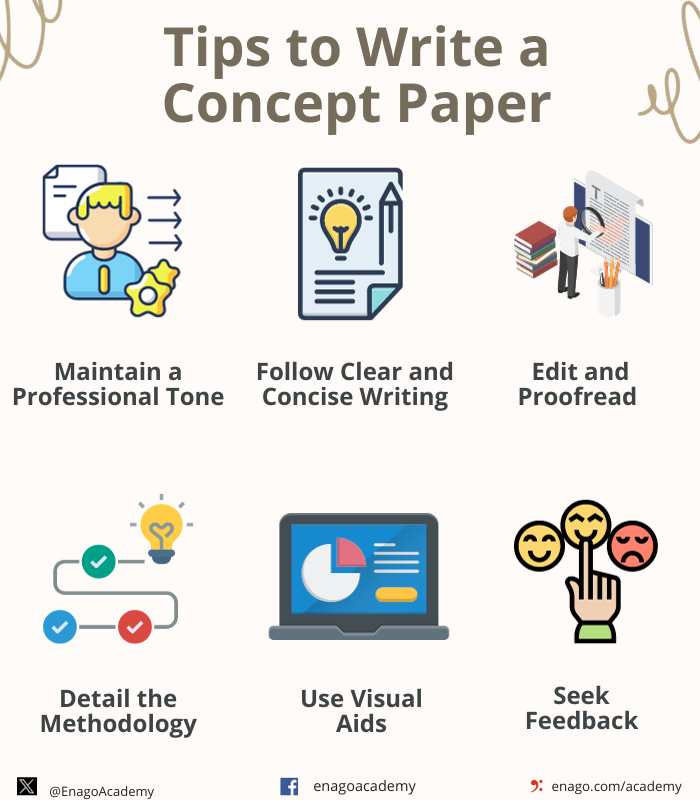
Example of a Concept Paper
Here is an example of a concept paper. Please note, this is a generalized example. Your concept paper should align with the specific requirements, guidelines, and objectives you aim to achieve in your proposal. Tailor it accordingly to the needs and context of the initiative you are proposing.
Download Now!
Importance of a Concept Paper
Concept papers serve various fields, influencing the direction and potential of research in science, social sciences, technology, and more. They contribute to the formulation of groundbreaking studies and novel ideas that can impact societal, economic, and academic spheres.
A concept paper serves several crucial purposes in various fields:
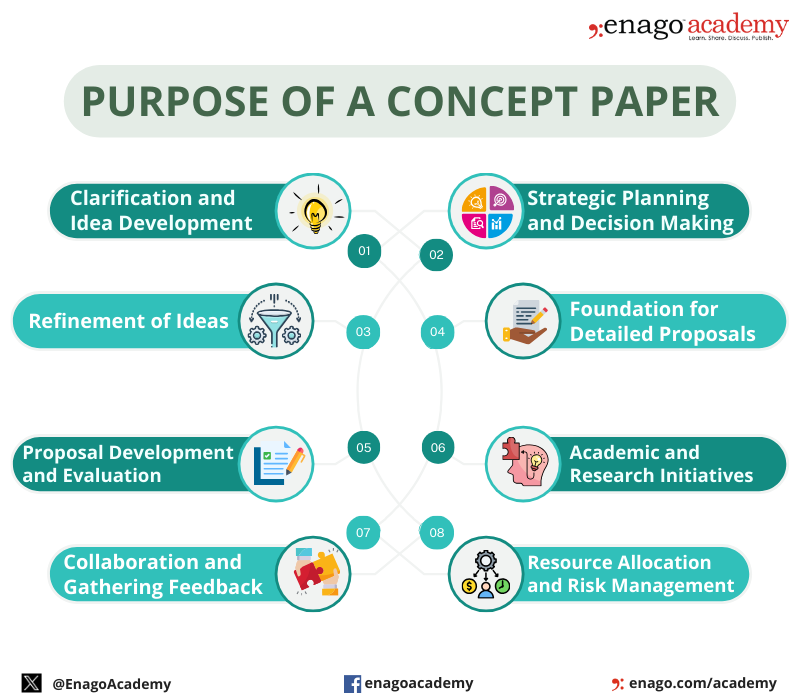
In summary, a well-crafted concept paper is essential in outlining a clear, concise, and structured framework for new ideas or proposals. It helps in assessing the feasibility, viability, and potential impact of the concept before investing significant resources into its implementation.
How well do you understand concept papers? Test your understanding now!
Fill the Details to Check Your Score

Role of AI in Writing Concept Papers
The increasing use of AI, particularly generative models, has facilitated the writing process for concept papers. Responsible use involves leveraging AI to assist in ideation, organization, and language refinement while ensuring that the originality and ethical standards of research are maintained.
AI plays a significant role in aiding the creation and development of concept papers in several ways:
1. Idea Generation and Organization
AI tools can assist in brainstorming initial ideas for concept papers based on key concepts. They can help in organizing information, creating outlines, and structuring the content effectively.
2. Summarizing Research and Data Analysis
AI-powered tools can assist in conducting comprehensive literature reviews, helping writers to gather and synthesize relevant information. AI algorithms can process and analyze vast amounts of data, providing insights and statistics to support the concept presented in the paper.
3. Language and Style Enhancement
AI grammar checker tools can help writers by offering grammar, style, and tone suggestions, ensuring professionalism. It can also facilitate translation, in case a global collaboration.
4. Collaboration and Feedback
AI platforms offer collaborative features that enable multiple authors to work simultaneously on a concept paper, allowing for real-time contributions and edits.
5. Customization and Personalization
AI algorithms can provide personalized recommendations based on the specific requirements or context of the concept paper. They can assist in tailoring the concept paper according to the target audience or specific guidelines.
6. Automation and Efficiency
AI can automate certain tasks, such as citation formatting, bibliography creation, or reference checking, saving time for the writer.
7. Analytics and Prediction
AI models can predict potential outcomes or impacts based on the information provided, helping writers anticipate the possible consequences of the proposed concept.
8. Real-Time Assistance
AI-driven chat-bots can provide real-time support and answers to specific questions related to the concept paper writing process.
AI’s role in writing concept papers significantly streamlines the writing process, enhances the quality of the content, and provides valuable assistance in various stages of development, contributing to the overall effectiveness of the final document.
Concept papers serve as the stepping stone in the research journey, aiding in the crystallization of ideas and the formulation of robust research proposals. It the cornerstone for translating ideas into impactful realities. Their significance spans diverse domains, from academia to business, enabling stakeholders to evaluate, invest, and realize the potential of groundbreaking concepts.
Frequently Asked Questions
A concept paper can be defined as a concise document outlining the fundamental aspects of a grant proposal such as the initial ideas, objectives, and theoretical framework of a proposed research project.
A good concept paper should offer a clear and comprehensive overview of the proposed research. It should demonstrate a strong understanding of the subject matter and outline a structured plan for its execution.
Concept paper is important to develop and clarify ideas, develop and evaluate proposal, inviting collaboration and collecting feedback, presenting proposals for academic and research initiatives and allocating resources.
I got wonderful idea
It helps a lot for my concept paper.
Information is key to the guidelines of a concept paper
Rate this article Cancel Reply
Your email address will not be published.

Enago Academy's Most Popular Articles

- Career Corner
Academic Webinars: Transforming knowledge dissemination in the digital age
Digitization has transformed several areas of our lives, including the teaching and learning process. During…

- Manuscripts & Grants
- Reporting Research
Mastering Research Grant Writing in 2024: Navigating new policies and funder demands
Entering the world of grants and government funding can leave you confused; especially when trying…


How to Create a Poster That Stands Out: Tips for a smooth poster presentation
It was the conference season. Judy was excited to present her first poster! She had…

Academic Essay Writing Made Simple: 4 types and tips
The pen is mightier than the sword, they say, and nowhere is this more evident…
![example of concept paper about education What is Academic Integrity and How to Uphold it [FREE CHECKLIST]](https://www.enago.com/academy/wp-content/uploads/2024/05/FeatureImages-59-210x136.png)
Ensuring Academic Integrity and Transparency in Academic Research: A comprehensive checklist for researchers
Academic integrity is the foundation upon which the credibility and value of scientific findings are…

Sign-up to read more
Subscribe for free to get unrestricted access to all our resources on research writing and academic publishing including:
- 2000+ blog articles
- 50+ Webinars
- 10+ Expert podcasts
- 50+ Infographics
- 10+ Checklists
- Research Guides
We hate spam too. We promise to protect your privacy and never spam you.
- Industry News
- Publishing Research
- AI in Academia
- Promoting Research
- Diversity and Inclusion
- Infographics
- Expert Video Library
- Other Resources
- Enago Learn
- Upcoming & On-Demand Webinars
- Peer Review Week 2024
- Open Access Week 2023
- Conference Videos
- Enago Report
- Journal Finder
- Enago Plagiarism & AI Grammar Check
- Editing Services
- Publication Support Services
- Research Impact
- Translation Services
- Publication solutions
- AI-Based Solutions
- Thought Leadership
- Call for Articles
- Call for Speakers
- Author Training
- Edit Profile
I am looking for Editing/ Proofreading services for my manuscript Tentative date of next journal submission:

In your opinion, what is the most effective way to improve integrity in the peer review process?

Community Blog
Keep up-to-date on postgraduate related issues with our quick reads written by students, postdocs, professors and industry leaders.
What is a Concept Paper and How do You Write One?
- By DiscoverPhDs
- August 26, 2020

What is a Concept Paper?
A concept paper is a short document written by a researcher before starting their research project, with the purpose of explaining what the study is about, why it is important and the methods that will be used.
The concept paper will include your proposed research title, a brief introduction to the subject, the aim of the study, the research questions you intend to answer, the type of data you will collect and how you will collect it. A concept paper can also be referred to as a research proposal.
What is the Purpose of a Concept Paper?
The primary aim of a research concept paper is to convince the reader that the proposed research project is worth doing. This means that the reader should first agree that the research study is novel and interesting. They should be convinced that there is a need for this research and that the research aims and questions are appropriate.
Finally, they should be satisfied that the methods for data collection proposed are feasible, are likely to work and can be performed within the specific time period allocated for this project.
The three main scenarios in which you may need to write a concept paper are if you are:
- A final year undergraduate or master’s student preparing to start a research project with a supervisor.
- A student submitting a research proposal to pursue a PhD project under the supervision of a professor.
- A principal investigator submitting a proposal to a funding body to secure financial support for a research project.
How Long is a Concept Paper?
The concept paper format is usually between 2 and 3 pages in length for students writing proposals for undergraduate, master’s or PhD projects. Concept papers written as part of funding applications may be over 20 pages in length.
How do you Write a Concept Paper?
There are 6 important aspects to consider when writing a concept paper or research proposal:
- 1. The wording of the title page, which is best presented as a question for this type of document. At this study concept stage, you can write the title a bit catchier, for example “Are 3D Printed Engine Parts Safe for Use in Aircraft?”.
- A brief introduction and review of relevant existing literature published within the subject area and identification of where the gaps in knowledge are. This last bit is particularly important as it guides you in defining the statement of the problem. The concept paper should provide a succinct summary of ‘the problem’, which is usually related to what is unknown or poorly understood about your research topic . By the end of the concept paper, the reader should be clear on how your research idea will provide a ‘solution’ to this problem.
- The overarching research aim of your proposed study and the objectives and/or questions you will address to achieve this aim. Align all of these with the problem statement; i.e. write each research question as a clear response to addressing the limitations and gaps identified from previous literature. Also give a clear description of your primary hypothesis.
- The specific data outputs that you plan to capture. For example, will this be qualitative or quantitative data? Do you plan to capture data at specific time points or at other defined intervals? Do you need to repeat data capture to asses any repeatability and reproducibility questions?
- The research methodology you will use to capture this data, including any specific measurement or analysis equipment and software you will use, and a consideration of statistical tests to help interpret the data. If your research requires the use of questionnaires, how will these be prepared and validated? In what sort of time frame would you plan to collect this data?
- Finally, include a statement of the significance of the study , explaining why your research is important and impactful. This can be in the form of a concluding paragraph that reiterate the statement of the problem, clarifies how your research will address this and explains who will benefit from your research and how.
You may need to include a short summary of the timeline for completing the research project. Defining milestones of the time points at which you intend to complete certain tasks can help to show that you’ve considered the practicalities of running this study. It also shows that what you have proposed is feasible in order to achieve your research goal.
If you’re pitching your proposed project to a funder, they may allocate a proportion of the money based on the satisfactory outcome of each milestone. These stakeholders may also be motivated by knowing that you intend to convert your dissertation into an article for journal publication; this level of dissemination is of high importance to them.
Additionally, you may be asked to provide a brief summary of the projected costs of running the study. For a PhD project this could be the bench fees associated with consumables and the cost of any travel if required.
Make sure to include references and cite all other literature and previous research that you discuss in your concept paper.
This guide gave you an overview of the key elements you need to know about when writing concept papers. The purpose of these are first to convey to the reader what your project’s purpose is and why your research topic is important; this is based on the development of a problem statement using evidence from your literature review.
Explain how it may positively impact your research field and if your proposed research design is appropriate and your planned research method achievable.

You’ve impressed the supervisor with your PhD application, now it’s time to ace your interview with these powerful body language tips.

Are you always finding yourself working on sections of your research tasks right up until your deadlines? Are you still finding yourself distracted the moment

An abstract and introduction are the first two sections of your paper or thesis. This guide explains the differences between them and how to write them.
Join thousands of other students and stay up to date with the latest PhD programmes, funding opportunities and advice.

Browse PhDs Now

There are various types of research that are classified by objective, depth of study, analysed data and the time required to study the phenomenon etc.

Academic conferences are expensive and it can be tough finding the funds to go; this naturally leads to the question of are academic conferences worth it?

De-Shaine is 2nd Year Neurotechnology PhD Student at Imperial College London. His research looks at monitoring the brain when it’s severely injured after a traumatic brain injury or stroke and patients are in neurocritical care.

Kai is a PhD student at Imperial College London. His research centres around sample efficiency, transfer learning and interpretability for deep reinforcement learning.
Join Thousands of Students
How to Write a Concept Paper Easily with Our Guide

Did you know that some of the most revolutionary ideas in history started with a simple concept paper? From scientific breakthroughs to groundbreaking inventions, the power of well-crafted concept papers cannot be underestimated.
In this article, experts at our academic essay writing service will demystify the process of writing a concept paper, offering straightforward tips and guidance to help you articulate your ideas effectively. Whether you're a researcher, entrepreneur, or student, you'll lay the foundation for your next big endeavor effortlessly.
Defining What is a Concept Paper
A concept paper is a starting point for any major project or research endeavor. When you're asked to write one, what your teachers or professors are really asking for is a clear, concise summary of what you plan to explore or investigate. It's your chance to explain your idea, why it matters, and how you're going to tackle it.
Imagine you're pitching your idea to someone who doesn't know anything about it. You want to grab their attention and get them excited about what you're planning to do. That's what a concept paper is all about – setting the stage for your project or research in a way that makes people want to learn more.
Don't Delay Your Scholarly Pursuits!
Our team is here to nurture your concepts! Seize this opportunity to lay the groundwork for your academic exploration.
Why Does a Concept Paper Matter
So, why does knowing how to write a concept paper for academic research matter? First off, it helps you clarify your thoughts and organize your ideas. Writing down your concept forces you to think through the details of your project, which can be super helpful, especially when things start to get overwhelming.
Secondly, it's a way to get feedback early on. By sharing your concept paper with your teachers, advisors, or classmates, you can get valuable input that can help you refine your idea and make it even better.
Plus, it shows that you're serious about your project. Taking the time to write a concept paper demonstrates to your instructors that you've put thought and effort into your work, which can earn you some serious brownie points.
Understanding How Long is a Concept Paper
When it comes to the length of a concept paper, think quality over quantity. It's not about hitting a specific word count; it's about conveying your ideas clearly and concisely. In general, a concept paper is meant to be short and to the point. You want to give enough detail to explain your idea thoroughly, but you don't want to overwhelm your reader with unnecessary information.
As a rule of thumb, most concept papers range from 1 to 3 pages. However, this can vary depending on your specific assignment or the requirements of the project you're proposing.
The key is to focus on the essentials. Include a brief introduction to your topic, a clear statement of your purpose or objective, an overview of your methodology or approach, and a summary of the potential impact or significance of your project. And if you ever need further help, simply ask us - write my research paper for the professionally crafted project.
Concept Paper Vs. Research Paper
While both concept papers and research papers are common in academia, they serve different purposes and have distinct formats.
.webp)
A concept paper, as we've discussed, is a concise document that outlines the basic idea or proposal for a project. It's like the blueprint or roadmap for your research endeavor. The focus here is on articulating the central concept, defining the objectives, and outlining the methodology. Think of writing a concept paper as laying the groundwork before diving into the detailed work of a research project.
On the other hand, a research paper is a more comprehensive and in-depth exploration of a topic or question. It involves conducting original research, analyzing data, and presenting findings in a formal written format. Research papers typically follow a structured format, including an introduction, literature review, methodology, results, discussion, and conclusion.
How to Write a Concept Paper in 8 Steps
Alright, getting into the nitty-gritty of writing your concept paper format might seem a bit overwhelming at first, but don't worry! We've got your back. By breaking down the process into eight manageable steps, we'll guide you through each stage with clarity and confidence.
.webp)
Define the Study Title and Its Objectives
The first crucial step in crafting your concept paper is to clearly define the study title and its objectives. This sets the foundation for your entire paper and helps guide your research direction.
Begin by crafting a clear and concise title that effectively communicates the essence of your study. Your title should be descriptive yet succinct, giving readers a glimpse into the focus of your research.
Next, outline the objectives of your study. What specific goals do you aim to achieve through your research? Be precise and realistic in outlining these objectives, ensuring they are achievable within the scope of your study.
Explain the Study's Context and Extent
After defining the title and objectives, it's essential to provide context and define the extent of your study. This step of how to write a concept paper for college helps readers understand the background and scope of your research.
Start by providing background information on the topic of your study. Discuss relevant theories, concepts, or existing research that contextualizes your work and highlights its importance.
Next, define the extent of your study by outlining its boundaries and limitations. What specific aspects of the topic will you focus on, and what areas will you exclude? Clarifying these boundaries helps ensure that your research remains focused and manageable.
Additionally, consider discussing the significance of your study within the broader field. How does your research contribute to existing knowledge, and what potential impact does it have?
Identify the Issue
This is where you clearly articulate the core challenge or question that your research seeks to explore. Start by providing a concise overview of the issue at hand. What is the specific problem or question that motivates your research? Why is it important or relevant within your field of study?
Next, consider providing context or background information that helps readers understand the significance of the issue. This could include discussing relevant trends, statistics, or real-world examples that highlight the importance of addressing the problem.
Finally, be sure to articulate the significance of the issue within the broader context of your field. Why is it important to study this particular issue, and what potential impact could your research have on addressing it?
List Goals and Objectives
In this step, you'll make a concept paper outline of the specific goals and objectives of your study. Goals represent the broader aims of your research, while objectives provide clear, measurable steps toward achieving those goals.
Start by defining your overarching goals. What do you hope to accomplish through your research? Think about the broader outcomes or changes you aim to bring about in your field or community.
Next, break down these goals into smaller, achievable objectives. Objectives should be specific, measurable, achievable, relevant, and time-bound (SMART). They should outline the concrete steps you will take to accomplish your goals.
Consider organizing your goals and objectives into a hierarchical structure, with broader goals at the top and more specific objectives underneath. Even if you'd rather buy essay from our pros, this step will help you provide clarity and coherence to your research plan.
Approach and Methodology
In this step, you'll detail the approach and methodology you'll use to conduct your research. According to our expert thesis writing services , this section is crucial as it outlines the methods you'll employ to address your research question and achieve your objectives.
Start by explaining your overall approach to research. Will you be conducting qualitative or quantitative research, or perhaps a combination of both? Describe the rationale behind your chosen approach and how it aligns with your research goals.
Next, outline the specific methodologies you'll use to collect and analyze data. This may include methods such as surveys, interviews, experiments, or literature reviews. Provide justification for why each method is appropriate for addressing your research question and objectives.
Be sure to consider any ethical considerations or limitations associated with your chosen methodologies and outline how you plan to address them.
Finally, discuss your data analysis plan. How will you analyze the data you collect to draw meaningful conclusions? Will you use statistical analysis, thematic coding, or another method?
Overview of Planned Methods and Expected Outcomes
In this step of how to write a concept paper for research, you'll provide an overview of the specific methods you plan to use and outline the expected outcomes or results.
Start by summarizing the methods you'll employ to collect data. This may include qualitative methods such as interviews or focus groups, quantitative methods such as surveys or experiments, or a combination of both. Briefly explain why you've chosen these methods and how they align with your research goals.
Next, outline the planned steps for implementing each method. Describe the procedures you'll follow to collect and analyze data, including any tools or instruments you'll use.
After detailing your methods, discuss the expected outcomes or results of your research. What do you hope to learn or discover through your study? How will your findings contribute to existing knowledge in your field?
Be realistic in your expectations and consider potential challenges or limitations that may affect your results. By acknowledging these factors upfront, you demonstrate a thoughtful and nuanced understanding of your research process.
Include Supporting Details
Here, you'll enrich your concept paper by incorporating supporting details that bolster your argument and provide additional context for your research.
Start by providing relevant background information or literature reviews that support your research topic. This could include citing key studies, theories, or concepts that inform your understanding of the issue.
Next, consider including any relevant data, statistics, or examples that illustrate the significance of your research topic. This could involve presenting findings from previous studies, real-world examples, or case studies that highlight the need for further investigation.
Additionally, discuss any theoretical frameworks or conceptual models that underpin your research approach. How do these frameworks help guide your study and shape your research questions?
Finally, be sure to cite your sources properly using the appropriate citation style (e.g., APA, MLA). This demonstrates academic integrity and allows readers to verify the information you've presented.
Wrap Up with a Summary
In this final step, you'll bring your concept paper to a close by summarizing the key points and reinforcing the significance of your research.
If you're uncertain how to write a conclusion for an essay , start by briefly recapping the main elements of your concept paper, including the research topic, objectives, methodology, and expected outcomes. This helps reinforce the central message of your paper and reminds readers of the key insights you've presented.
Next, reiterate the importance of your research topic and its potential impact within your field. Emphasize how your study fills a gap in existing knowledge or addresses a pressing issue, highlighting the relevance and significance of your research.
Finally, conclude with a call to action or a thought-provoking statement that encourages further reflection or discussion. This could involve suggesting avenues for future research, proposing practical implications for policymakers or practitioners, or inviting readers to consider the broader implications of your findings.
Tips for Writing a Concept Paper
Now that you've got a solid understanding of how to write a concept paper, let's explore some invaluable tips to help you navigate the writing process with finesse.
- Be Specific in Your Objectives : Clearly define your objectives with measurable outcomes. Avoid vague language and ensure each objective is actionable and achievable within the scope of your study. Specific objectives provide clarity and help guide your research effectively.
- Provide Contextual Background : Offer sufficient background information to contextualize your research topic. This includes explaining relevant theories, historical context, or existing literature related to your study. Providing context in your concept paper helps readers understand the significance of your research and its relevance within the broader field.
- Justify Your Methodological Choices : Explain why you've chosen specific research methods and justify their appropriateness for your study. Consider factors such as feasibility, ethical considerations, and alignment with your research objectives. Providing a rationale for your methodological choices adds credibility to your research approach.
- Anticipate and Address Limitations : Acknowledge potential limitations or challenges associated with your study and discuss how you plan to mitigate them. This demonstrates a thoughtful approach to your research and shows that you've considered the broader implications of your study. Being transparent about limitations also helps manage expectations and build trust with your audience.
Concept Paper Example
Now that we've explored the steps and tips for writing a concept paper let's put theory into practice. In this section, we'll provide you with a concept paper example to illustrate how these principles can be applied in a real-world scenario.
Eager to See Your Ideas Leap Off the Page?
Don't wait any longer—bring your concepts to life with our expertly crafted concept papers.
Concept Paper Topics
In this section, we'll provide you with a range of thought-provoking concept paper ideas spanning various disciplines and interests. Whether you're passionate about social issues, scientific advancements, or want to learn how to research a topic on cultural phenomena, you're sure to find inspiration here.
- The Influence of Instagram Fitness Influencers on Body Image Perception Among Adolescent Girls
- Implementing Bicycle-Sharing Programs to Reduce Carbon Emissions in Downtown Metropolitan Areas
- Analyzing the Effectiveness of Food Pantry Programs in Alleviating Food Insecurity Among Undergraduate Students at Urban Universities
- Assessing the Accuracy and Efficiency of Machine Learning Algorithms in Early Detection of Breast Cancer Using Medical Imaging Data
- Strategies for Increasing Female Representation in Computer Science and Engineering Programs at Universities
- Investigating the Impact of Workplace Mindfulness Programs on Employee Burnout Rates in High-stress Industries
- Barriers to Accessing Mental Health Services in Rural Appalachia: A Case Study
- The Ecological Impact of Microplastic Contamination on Coral Reef Ecosystems in the Caribbean
- Addressing Online Harassment and Cyberbullying Among Middle School Students Through Digital Literacy Education Programs
- The Relationship Between Proximity to Parks and Greenspaces and Mental Health Outcomes in Urban Dwellers: A Cross-sectional Study
- Virtual Reality Rehabilitation for Upper Limb Motor Recovery After Stroke: A Comparative Analysis of Traditional Therapy Methods
- Evaluating the Economic Viability and Environmental Sustainability of Indoor Vertical Farming Systems in Urban Settings
- Psychological Profiles of Adolescent Online Gamers: A Longitudinal Study on Risk Factors for Gaming Addiction
- Peer Mentoring Interventions for Improving Academic Performance and Retention Rates Among First-generation College Students in STEM Majors
- Universal Basic Income Pilot Programs: Assessing Socioeconomic Impacts and Policy Implications in Scandinavian Countries.
And there you have it - you've journeyed through the ins and outs of concept paper writing! You've learned the ropes, discovered valuable tips, explored an example, and got a bunch of topic ideas to fuel your creativity.
Now armed with the know-how, it's time to dive in and start crafting your concept paper. Remember to keep it focused, stay organized, and don't forget to let your passion shine through. With your enthusiasm and newfound skills, there's no doubt you'll create a paper that grabs attention and makes a real impact in your field.

Daniel Parker
is a seasoned educational writer focusing on scholarship guidance, research papers, and various forms of academic essays including reflective and narrative essays. His expertise also extends to detailed case studies. A scholar with a background in English Literature and Education, Daniel’s work on EssayPro blog aims to support students in achieving academic excellence and securing scholarships. His hobbies include reading classic literature and participating in academic forums.

is an expert in nursing and healthcare, with a strong background in history, law, and literature. Holding advanced degrees in nursing and public health, his analytical approach and comprehensive knowledge help students navigate complex topics. On EssayPro blog, Adam provides insightful articles on everything from historical analysis to the intricacies of healthcare policies. In his downtime, he enjoys historical documentaries and volunteering at local clinics.
%20(1).webp)
Concept paper on Technology Integration and English Language Teaching in the Philippines context

- St. Michael's College
Discover the world's research
- 25+ million members
- 160+ million publication pages
- 2.3+ billion citations
Supplementary resource (1)
- R E Aguilar
- V G Benigno
- J R Baniqued
- C V Ducusin
- Recruit researchers
- Join for free
- Login Email Tip: Most researchers use their institutional email address as their ResearchGate login Password Forgot password? Keep me logged in Log in or Continue with Google Welcome back! Please log in. Email · Hint Tip: Most researchers use their institutional email address as their ResearchGate login Password Forgot password? Keep me logged in Log in or Continue with Google No account? Sign up
Academia.edu no longer supports Internet Explorer.
To browse Academia.edu and the wider internet faster and more securely, please take a few seconds to upgrade your browser .
Enter the email address you signed up with and we'll email you a reset link.
- We're Hiring!
- Help Center
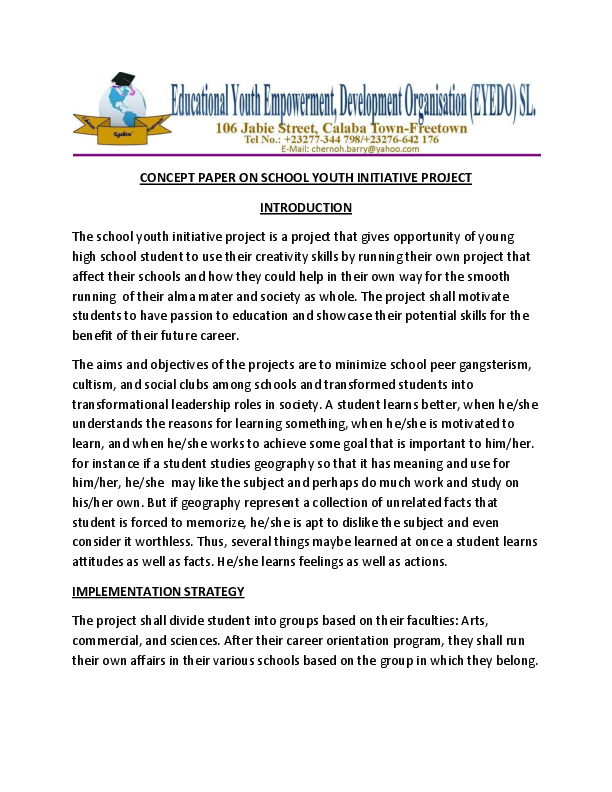
CONCEPT PAPER ON SCHOOL YOUTH INITIATIVE PROJECT INTRODUCTION

Related Papers
Eva Erdelyi
Procedia - Social and Behavioral Sciences
Çetin DOGAR
Proceeding of Saizu International Conference on Transdisciplinary Religious Studies
ulpah maspupah
The researcher saw the management of talent development and interest in students of the Islamic Boarding School An Najah Purwokerto very representative for review. Good management has touched the development of students' talents and interests. The management can be seen from the existence of the Student Santri Organization (Osma) which is included in the education curriculum of Pesma An Najah Purwokerto. Through Osma, students are directed to develop their talents and interests. The aim is to shape the mentality of students who are competitive by being able to show their skills or talents of interest when they are involved in society. Santri is expected not only to wrestle in the world of religion but also in other aspects of life. Pesma An-Najah Purwokerto is unique compared to other Islamic boarding schools in the Banyumas area. An-Najah Pesma has a diverse student body of student organizations compared to other pesantren. There are several santri organizations that other pesa...
Perspektivy nauki i obrazovania – Perspectives of Science and Education,
Publishing House L L C "Scientific and Educational Initiative"
The formation of a sociocultural educational environment, as well as the creation of the conditions required for socialization and comprehensive development of an individual, are the urgent tasks for a modern academic institution. Extracurricular work, as a complex activity aimed at training of a specialist, the development of his creative and research abilities and social qualities, provides the irreplaceable help. The organization of extracurricular work is considered as a process of student’s personality formation. In 2017-2018, the extracurricular activities took place at the Moscow Banking College of the Russian Academy of National Economy and Public Administration under the President of the Russian Federation in the main fields of the “Program for the Development and Socialization of a Person, Students’ Health Preservation”. Eighty-three first-year students participated in two stages of the study. The following methods were used: the projective technique “Non-existent animal” (M.Z. Dukarevich); Buss-Durkee questionnaire for aggression identification. The scales of these methods were applied to evaluate the results of socialization of the students participating in extracurricular activities. The Program implementation results showed a significant decrease in students' anxiety and aggressiveness indicators. The data obtained showed that the implemented Program contributed to the activation of the process of personal development and socialization of students, their health improvement. The implementation of extracurricular and educational work has a positive result in the social environment, which, being formed in an educational institution, creates the conditions for self-development and personality development, forms the basis for life self-determination, responsible behavior and healthy lifestyle skills for students. Key words: creativity, educational standard, extracurricular work, educational work, extracurricular activities, professional education, student scientific club
Rakhi Roy Halder
We know that education system is back bone of society, but it is also a fact that even after 69 years of independence such educational hubs capable of creatingsocially conscious and active citizens are rarely found. Aspiration of securing high marks and grabbing high salaried job through education is motivating new generation to get prepared to race in the market. As a result the competitive and self centered attitude controls their mind and restricts the socialization of their personality. Unlimited desire of gaining all means of comfort, false vanity and ego centric attitude along with competitive mentality invites the diseases like hypertension in their lives. It could be counted as the short come of education system to develop efficient philosophy of life among new generation. Dissemination of knowledge in institution with an aim to make an individual realize personal and social responsibilities can lead to the formation of philosophy of life in students. Developing concept from information provided in chapter and creatinga vision to understand and identify the dynamics and crises of society can motivate especially the Arts students to think of ways to facilitate the society through application of their knowledge. Students of Arts discipline can be inspired to think of ways to combat the socio-cultural crises of present era. The students of Economics may be motivated tothink of ways to get financial support from the businessmen community for the upliftment of any area. This approach can promote research oriented, creative thinking among students.Creating visionary and creative students demands effective teaching strategy along with clubbing of contents in meaningful clusters. The collective efforts of teachers and educationists through series of discussions and workshops are required to make this possible. Present era demands innovative and interdisciplinary approach in field of higher education especially in social science with long-term orientations on social and cultural aims and needs.Though our education system requires massive changes to meet this requirement butkeeping pace with the demand of time the university education system must have some scope to create and disseminate knowledge through research and provide a service to the community in socio cultural field. In order to enable university education system to play such significant role in society 'Community Service Research Cell' can be established in university. It can promote research oriented community service by providing platform to the students interested in planning effective projects based on knowledge gained from formal education and implementing it skillfully in society.The approach of work must be interdisciplinary as any crisis related to human life and society usually needs to be seen in its historical context to understand the roots effectively. It is pertinent to understand the psychological impact of the crisis in the lives of the people. The economic and the financial perspectives are needed to be explored to plan an effective project to combat the crisis. Besides, literary/ artistic/ educational or other disciplinarian approaches can enable a project thereby creating a positive impact in the social condition of the locality.
Due to the frequent change in expectations from education/learning, youth, the educational system’s most dynamic participants, are experiencing low-level motivation in education and learning, because of growth and psychological characteristics or sociological, economic, and other reasons. This negative process is pushing program-developers, educational administrators and particularly teachers to investigate its reasons. To get such data, “education of youth” associations were investigated among youths (N=283) of different countries (Turkey, America, Russia, Ukraine) and 464 valid associations in 6 categories were obtained. The data analysis determined that Turkish students produced mostly individual (71.84%) and critical/negative (34.16%) associations. Most positive associations had qualities of “expectations, hope, and advantage.” Taking the associations into consideration, regulating educational environments can be used as a strong data in increasing motivation and developing educational policies.
AubRey Bermudez
Analysis of Professional Interests of High School Students
Dr.Fatih Mutlu ÖZBİLEN
The purpose of this study is to determine the level of professional interests of high school students and to analyze them in terms of various variables. Study group of the study consists of 448 high school students receiving education in the province of Nevşehir. "Professional interest scale" was used as data collection tool in the study. In the analysis of the data, t test, one-way analysis of variance (ANOVA), and Tukey's multiple comparison test were used. At the end of the study, the level of professional interests of the high school students was found to be higher than mean, and it was found that there were significant differences between the groups according to the variables such as gender, the level of knowing themselves, how they describe themselves, and their knowledge about the profession to be chosen. 52.1 Introduction Education is an important process for raising the qualified human power that societies aim. Regulations are made, and the success chart is upgraded so that the education system can be successful. The success of the instructional program carried out by states' ministries in charge of education, policymakers, program development specialists, educational institutions, and educators involved in the implementation process is, undoubtedly, about how the inputs of the system have become the output. The demonstration of whether an educational system has succeeded can be seen more realistically with the prolonged expansion of the plans. In Turkey, rather than in other countries, that this kind of long-term plans are not arranged much and frequent changes occur in certain parts of the education system or in the vast majority of the education system are seen as a significant problem. Beyond a doubt, those who
Abisaki Oloo
The presence of non-formal curricular activities in schools and the availability of resources that promote the same are indicators of possible implementation of NFCAS. Hence the focus of this study was to analyze the NFCAS offered in secondary schools in Mumias Sub-County, Kakamega County. In order to achieve the set objectives the researcher sought to establish the NFCAS that are available in secondary schools and the NFCAS that were popular, the adequacy of the facilities that promote NFCAS and the frequency of participation of students in NFCAS. Descriptive survey design was employed. Random sampling was undertaken to identify the school types while purposive sampling was used to select the respondents that were information rich. 16 schools, 22 heads of schools, 154 teachers, 1154 students and 1 District Quality Assurance and Standards Officer were derived from the total population. The NFCAs available included a variety of games and sports, clubs and societies and performing art...
Lawrence Chikonye
Loading Preview
Sorry, preview is currently unavailable. You can download the paper by clicking the button above.
PSEB 8th Hindi 2nd Language Sample Paper 2024-25 (PDF) – Punjab Board Model Paper for Class 8 Hindi 2nd Language!
Punjab board pseb class 8 hindi 2nd language sample paper 2024-25: pseb class 8th hindi 2nd language sample paper has been published by the punjab school education board. students and teachers can download the sample paper pdf for free..

Punjab Board Class 8 Hindi 2nd Language Sample Paper 2024-25
Important Points To Know Before Attempting The Sample Paper
- Before solving the sample paper, it is important to complete the full syllabus of Hindi 2nd Language in the class itself.
- Before attempting the sample paper, ensure that you have revised the full syllabus thoroughly.
- The sample paper has also made available the answer key for the students to recheck their answers.
- Solving the sample papers can give you an idea about the types of questions that might come for the exam.
- Solving the sample papers can also help the students to manage them accordingly to complete the paper efficiently.
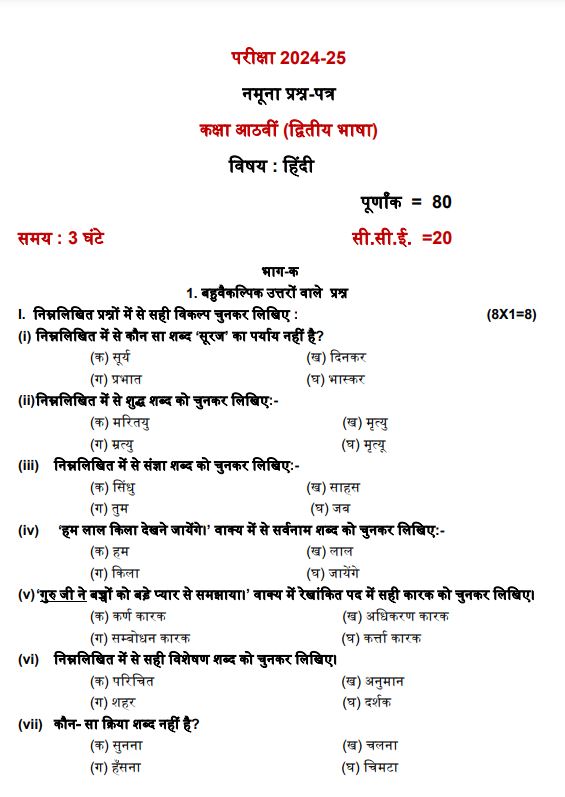
We are also providing the Free PDF to download the sample paper for free. PDF formats are the best to download any large files. With the help of the sample paper, students can start preparing for the end-term exams to score well.
CHECK: Punjab Board PSEB Class 8 Hindi 2nd Language Sample Paper 2024-25
- PSEB Class 8 Model Papers 2024-25: Download Model Test Papers Of All Subjects In PDF!
- PSEB Class 8 Home Science Model Paper 2024: Download FREE PDF!
Get here latest School , CBSE and Govt Jobs notification and articles in English and Hindi for Sarkari Naukari , Sarkari Result and Exam Preparation . Download the Jagran Josh Sarkari Naukri App .
- India Post GDS Merit List 2024
- India Post GDS Result 2024
- UP Police Constable Admit Card 2024
- UGC NET Exam Analysis 2024
- UPSC Calendar 2025
- India GDS Merit List 2024 PDF
- UP Police Exam Analysis 2024 Live Updates
- Happy Janmashtami Wishes
- Sri Krishna
- Janmashtami Wishes in Hindi
Latest Education News
SGBAU Result 2024 OUT at sgbau.ucanapply.com, Direct Link to Download UG and PG Marksheet
SNPV Result 2024 OUT at snpv.ac.in; Direct Link to Download UG and PG Odd Semester Marksheet
UP RTO: नंबर प्लेट पर लिखा कौन-सा कोड किस जिले को दर्शाता है, देखें पूरी सूची
क्या होता है Digital Arrest, यहां जानें
Cricketer Jasprit Bumrah Visits Sathyabama University on Fresher’s Day
SSC GD Bharti 2025: 5 सितम्बर को जारी होगी एसएससी जीडी की अधिसूचना, नोटिस जारी
SSC GD Recruitment 2025 Live: Constable Notification Postponed, Check New Date Here
लद्दाख में कौन-से जुड़े हैं पांच नए जिले, यहां जानें
Unified Pension Scheme: लाभ, पात्रता, न्यूनतम पेंशन राशि, पेंशन कैलकुलेटर सहित सभी डिटेल्स यहां देखें
APSC JSO Hall Ticket 2024 Out at apsc.nic.in: Check Steps To Download Hall Ticket
PM Kisan Beneficiary Status: डायरेक्ट Link से देखें PM-Kisan Samman Nidhi बेनिफिशियरी स्टेटस
MPBSE Class 11 Physical Education Syllabus 2024-25: Download MP Board Marking Scheme PDF
NDA Admit Card 2024 Out at upsc.gov.in: Direct Download UPSC NDA 2 Hall Ticket Link Here
Picture Puzzle IQ Test: Prove Your Intelligence – Find the Hidden Number in 8 Seconds!
Personality Test: Your Heart Line Reveals Your Hidden Personality Traits
Brain Teaser IQ Test: How Many Eggs Are Left? 99% Fail To Answer in 8 Seconds!
Personality Test: Your Finger Length Reveals Your Hidden Personality Traits
The Evolutionary Puzzle: Theories explaining why the Y chromosome is shrinking
Difference Between X and Y Chromosomes
SSC CGL Admit Card 2024 OUT at ssc.gov.in: Download Tier 1 Call Letter for CR, NWR, WR, MPR Region

IMAGES
COMMENTS
This document provides a concept paper for a research project that aims to analyze the current instructional consultation program and assess students' perceptions of it at a higher education institution. The project objectives are to improve student-teacher relationships and instructional consultation practices in line with institutional goals. Main activities will include distributing ...
In this concept paper we describe a framework (a 3 x 3 model of 21st-century learning) for guiding our discussion on the substance of STEM education. This framework is based on research conducted by and reported in Kereluik, Mishra, Fanhoe, & Terry (2013). Further details are provided in the end notes. In this concept paper we describe this ...
Concept Paper vs. Research Proposal. Getting Started on Your Concept Paper. 1. Find a research topic you are interested in. Tips for finding your research topic. 2. Think of research questions that you want to answer in your project. 3. Formulate your research hypothesis.
follow these steps: 1. Concept paper title. Every pa per must have a title and concept paper is not left out as one needs to have a title that. summarizes what the paper is about. The title should ...
Additionally, infographics and scientific illustrations can enhance the document's impact and engagement with the audience. The steps to write a concept paper are as follows: 1. Write a Crisp Title: Choose a clear, descriptive title that encapsulates the main idea. The title should express the paper's content.
Write to your audience. A concept paper is a piece of academic writing, so use a professional tone. Avoid colloquialisms, slang, and other conversational language. Your concept paper should use the same tone and style as your accompanying research paper. Write according to your reader's familiarity with the subject of your concept paper.
This series of Oxfam IBIS concept papers define the Oxfam IBIS' understanding and approach in key areas. Each paper contains the following sections: Justifi cation for Oxfam IBIS' work on the issue. Brief overview of relevant theories and definitions. Presentation of Oxfam IBIS' approach and lessons learned. References to further ...
A concept paper is often used to generate feedback and guidance from a program officer before a full grant proposal is developed. In most cases, the program officer will be, or will have been, a researcher, clinician, or scholar, like yourself. Before you start writing, think about the Golden Rule and the kind of project summary you'd like to ...
Funders that request concept papers often provide a template or format. If templates or formats are not provided, the following can serve as a useful concept paper structure. THE FIVE ELEMENTS OF A CONCEPT PAPER 1. The first section, the Introduction, identifies how and where the applicant's mission and the funder's mission intersect or align.
Oxfam IBIS Concept Paper: Education and Gender, version 1, March 1st, 2017 This series of concept papers was introduced June 1st, 2014 with the target audience being Oxfam IBIS staff and management as well as partners and stakeholders. The papers have been developed through a participatory process and are living documents to be revised whenever ...
A pre-proposal or white paper is. a concise, authoritative document that presents a summary of the proposed research, methodology, team, and an estimated budget. Unlike proposals, which include more extensive information, white papers offer a brief overview of. a research project in a way that explores why it would be important to a funder.
1. To explore and expand an idea: Researchers can use concept papers to transform an incipient research idea into a focused, high-quality study proposal. The paper is also a means to obtain feedback that can be used to strengthen a detailed proposal at a later stage. 2. To draw the interest of funding agencies: Through an effective concept ...
Preparing a Concept Paper for Funded Research 3 Originally prepared by the College of Education Research Coordinator with much appreciation from C3 Consider and incorporate the Research Coordinator's suggestions. Share this first iteration of your concept paper with research colleagues, including colleagues at Texas State and other
Concept paper: Early Childhood Education and Care Context Early childhood education and care (ECEC), as defined by UNESCO, is the "holistic development of a child's social, emotional, cognitive and physical needs in order to build a solid and broad foundation for lifelong learning and wellbeing." Extensive academic
For example, I personally spend about two up to ten long hours in completing my schoolwork, most of which still done in front of my device. With many works to accomplish congested in each of their days, usually including the insufficient weekends as well, students also bear a lot of pressure put upon their shoulders with the thought of wanting ...
A concept paper is a short document written by a researcher before starting their research project, with the purpose of explaining what the study is about, why it is important and the methods that will be used. The concept paper will include your proposed research title, a brief introduction to the subject, the aim of the study, the research ...
The first crucial step in crafting your concept paper is to clearly define the study title and its objectives. This sets the foundation for your entire paper and helps guide your research direction. Begin by crafting a clear and concise title that effectively communicates the essence of your study. Your title should be descriptive yet succinct ...
CONCEPT PAPER ON QUALITY EDUCATION Empowerment for Life (E4L) has a holistic approach to education in particular and to development as a whole. By holistic, it means looking at the whole human being (psychologically, intellectually, physically and morally). ... The report cited North Dayi in the Volta Region of Ghana as an example, that ...
Concept Paper on the The K to 12 Basic Education Curriculum Framework - Free download as Word Doc (.doc / .docx), PDF File (.pdf), Text File (.txt) or read online for free. The Philippines launched its "K to 12" program in 2012, a comprehensive reform of basic education. It is catching up with global standards in secondary education through this reform and attaching high value to the kindergarten.
This concept paper explores the top five current approaches and methods used in English Language Teaching (ELT). With the growing importance of English as a global language, the demand for ...
Concept Paper (Revised) - Free download as Word Doc (.doc / .docx), PDF File (.pdf), Text File (.txt) or read online for free. This document discusses the use of technological tools and social media platforms to develop effective instructional materials during the COVID-19 pandemic. It aims to identify the impact of these tools on material development and differentiate online from traditional ...
TARGET GROUP The school youth initiative projects shall target high school students in the s.s.s 1 forms among the various schools targeted. These student shall be first breed of youths with a change mind set for the next generation in Sierra Leone.
PSEB Punjab Board Class 12 Physics Model Test Paper 2025: PSEB Class 12 students download the latest sample paper for Physics for 2025 Board examinations. Download free pdf from the direct link.
For example, platforms like ChatGPT can personalize curriculums to cater to different learning styles. ... Note Reference [1] She added that student essays no longer have typos or grammatical errors, ... More Examples of AI in Higher Education. AI still has significant growth areas, such as AI-powered grading, AI-driven course recommendation ...
The Five Elements of a Concept Paper. The first section, the Introduction, identifies how and where the applicant's mission and the funder's mission intersect or align. It addresses the reasons why this funder should support projects in this general area. It also introduces the applicant's partners and shows why the partners want to ...
Well, Punjab School Education Board model papers are an important resource for Class 8 students. The sample paper is for the students who have opted for Sanskrit as one of the subjects in class 8.
Punjab Board PSEB Class 8 Hindi 2nd Language Sample Paper 2024-25: If you are a class 8th student of Punjab Board, then you can look at this sample paper to study and score well for the exam ...